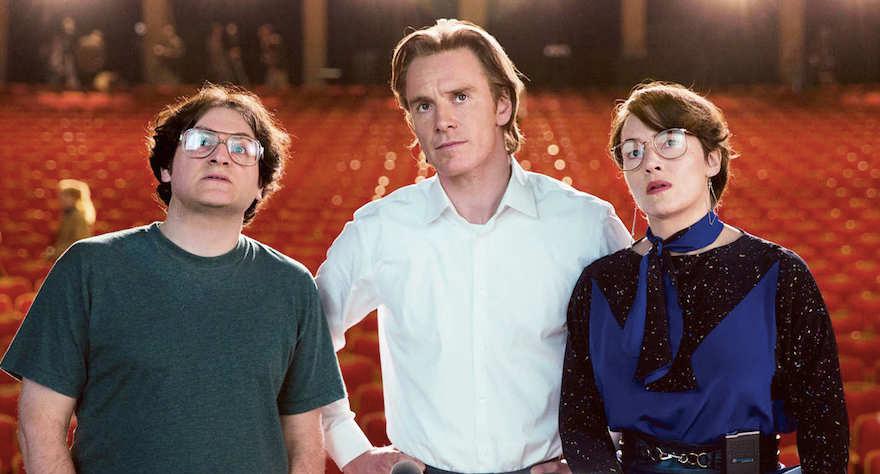
Expertly crafted, Danny Boyle enlivens this biopic with riveting structure and a whirlwind pace.

Expertly crafted, Danny Boyle enlivens this biopic with riveting structure and a whirlwind pace.
With sleek packaging that would make the late Apple CEO proud, Steve Jobs is a biopic told in three extended scenes, over the course of three separate product launches. Alternately taking place in 1983, 1988 and 1998, the newest film from director Danny Boyle (Trainspotting, Slumdog Millionaire) begins in chaos with arguments bleeding into one another. An audience of eager techies waits outside the 1983 Apple Keynote while Jobs (Michael Fassbender) stands center stage demanding that the Mac on display say, “Hello.” He orders Mac developer Andy Hertzfeld (Michael Stuhlbarg) to fix this problem while Joanna Hoffman (Kate Winslet) pulls him backstage to handle other issues; he meets with Apple co-founder Steve Wozniak (Seth Rogen) as his estranged wife (Katherine Waterston) and daughter (played by Makenzie Moss, Ripley Sobo, and Perla Haney-Jardine during different time periods) wait for him in a dressing room; he balances all these tasks, never doing just one thing at a time.
Credit the breakneck pace to writer Aaron Sorkin (The Social Network, Moneyball), whose wordy diatribes have been both the subject of praise (The West Wing) and scorn (Studio 60 on the Sunset Strip). Few writers are as capable of making intelligent people sound smart, and here he’s once again demonstrated that ability. In Steve Jobs, Sorkin’s script sends the actors careening into one another. Their piercing verbal takedowns and cleverly dismissive retorts provide a staccato rhythm that remains humorous and enthralling for the duration of the movie. Steve Jobs cares about ego, and characters who demand or want credit for their contributions. “I’m tired of being Ringo when I know I was John,” Woz yells at his friend and collaborator. The script spends as much time building its characters up as it does tearing them down.
Imposing this 3-part structure requires Sorkin to reach for several storylines simultaneously. It’s a structural conceit that asks the audience to overlook that sense of “the gang’s all back together” each time its central characters are reintroduced for later scenes. Steve Jobs is more of an impressionistic portrayal of the tech innovator than all-encompassing biopic, but this assembly is far more entertaining than what the conventional treatment allows (looking at you, Jobs).
New chapters begin with an exposition dump through montage and dialog. The script maintains a high energy, which allows the actors’ emotive line delivery to cover up the expositional nature of some of their interactions. It gets messy during a section in the middle of the film, when editor Elliot Graham (21, Milk) jumps from flashbacks to the height of an argument between Jobs and his former boss, John Sculley (Jeff Daniels). More often, the film is electric, smoothly transitioning between its exciting moments.
Fassbender commands attention on-screen as Jobs. His magnetism transcends Sorkin’s depiction of Steve Jobs as an unrelenting asshole (who relents a bit too much by the end). He embodies the character’s unchecked sense of superiority through his disaffected saunter and casually spoken insults, delivering a well-timed, “Fuck you,” as if it were completely innocuous. It’s one of the actor’s most fascinating roles to date, elevated by the A-class ensemble around Fassbender. In particular, Kate Winslet nails Joanna Hoffman’s subtle Polish accent while serving as a sounding board and frequent scene partner to Fassbender’s Jobs.
Director Danny Boyle blends the dynamism of the script and the actors’ performances with his mastery for technical flairs. Shooting each time period in its own format—16mm for 1983, 35mm for 1988, and digitally for 1998—Boyle implies the technological progress through these periods. The filmmaker matches Sorkin’s rapid-fire dialog by condensing as much visual information into each frame as it will allow. He laces his scenes with the shortest of cutaways to a crowd stomping their feet in anticipation of Jobs’ latest unveiling or a brief glimpse of Jobs and Woz back in the garage.
The overwhelming display of craft makes Steve Jobs among the most stimulating biographical films in recent years. Any liberties Sorkin takes in adapting the famous Walter Isaacson biography of Steve Jobs serves to accentuate the underlying conflicts in Jobs’ life. Its gripping first few moments ultimately prove to be the film’s best ones, as the momentum gradually slows by act three; however, Steve Jobs is nonetheless a highly entertaining look at an icon and the ways in which his hard-headed determination affected those in his radius. Lead by one of the year’s best performances, Steve Jobs is constantly compelling perspective on the shortcomings of a man who achieved greatness.